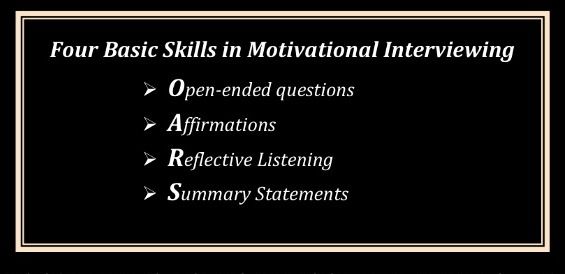
Motivational Interviewing (MI) is a counseling approach first described by Professor William R. Miller, PhD, in an issue of Behavioral Psychotherapy in 1983. As the name suggests, this technique is about motivating the client to change a destructive behavior.
This is often used for addiction as lack of motivation to quit can be one of the greatest barriers for individuals struggling with addiction, even in spite of health issues and financial, social, and legal consequences.
The thought behind Motivational Interviewing is that all individuals dealing with addiction are at least partially aware of the negative consequences of drug abuse and addiction. Each individual is also currently in a certain stage of readiness when it comes to changing their behavior.
The MI therapist facilitates the process of getting ready to change by overcoming ambivalence or a fear of change, increasing the client’s own motivation.
According to the Substance Abuse and Mental Health Services Administration’s (SAMHSA) National Survey on Drug Use and Health, in 2009, there were 23.5 million Americans in need of treatment for addiction disorders. Many addicted individuals lack motivation to change for three main reasons.
Firstly, they don’t think that their substance abuse problem is as serious as it really is.
Secondly, they don’t want to give up the positive sensations associated with their drug use.
Lastly, they fear the consequences of ceasing substance use, including withdrawal symptoms and cravings. Many addicted persons actually go through stages of grief after giving up their drug of choice.
MOTIVATIONAL INTERVIEWING HAS BEEN SHOWN TO BE EFFECTIVE NOT ONLY IN CLIENTS WHO HAVE VOLUNTARILY SOUGHT OUT TREATMENT, BUT ALSO IN THOSE WHO HAVE BEEN GIVEN REQUIRED ADDICTION TREATMENT AS PART OF A LEGAL SETTLEMENT OR PRESSURED INTO IT BY LOVED ONES.
There ARE SEVEN KEY ELEMENTS that should be maintained across variations in MI technique. These are:
- Motivation comes from the client, not from outside sources.
- The client is responsible for resolving ambivalence, not the counselor.
- Ambivalence cannot be resolved through direct persuasion.
- The counselor quietly elicits information from the client.
- The counselor guides the client in recognizing and resolving ambivalence.
- Readiness to change is a fluctuating result of interpersonal interaction, not a trait.
- The client-counselor relationship should resemble a partnership.
Limitations
Although MI has helped many people to find the motivation to get on the path to recovery, it’s not the ideal course of treatment for everyone. For those who have co-occurring mental illnesses and more complex addiction issues, simple motivation may not be enough. MI in particular is designed to last for as little as four sessions. An individual with significant underlying mental illness will need a much more in-depth method of counseling, possibly combined with medication, in order to get to a place where motivation is even a possibility. This is especially true for individuals with major depressive disorders, which are often characterized by a lack of motivation. Clients who lack the cognitive clarity to focus on pros and cons, and come up with a plan, are also unlikely to be helped by MI.This could include individuals with more severe mental illnesses, such as bipolar disorder or schizophrenia, as well as persons with intellectual disabilities. Also, those who have been recently medicated for mental illness often experience temporary side effects that reduce their ability to focus. These clients may need time to adjust or find the right medication before MI will be effective for them.
The key to whether or not MI will be effective often depends on the counselor. MI is a difficult treatment method to master, as the counselor needs to be able to build trusting relationships with many different types of people since just about anyone can become addicted to a substance. Substantial patience and understanding are necessary, yet the process is also designed to go quickly due to the fact that many individuals are unable to pay for much therapy or may be in the midst of legal battles related to drug use. However, a counselor who can overcome these challenges may be able to help those who have been unsuccessful with other treatment methods.


